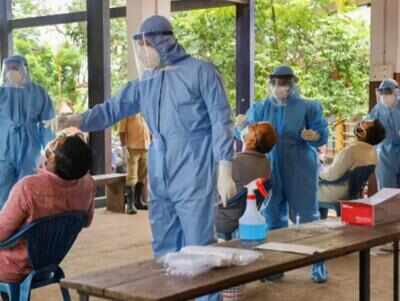- News
- City News
- coimbatore News
- Tamil Nadu: Fall in fresh Covid-19 cases slows, 15 districts report slight increase
Tamil Nadu: Fall in fresh Covid-19 cases slows, 15 districts report slight increase

On Thursday, Tamil Nadu reported 4,481 new cases compared to 4,506 on Wednesday. (Image used for representational purpose only)
CHENNAI: Tamil Nadu is closer to the baseline of the second wave, but officials and epidemiologists are now worried as the fall in fresh cases has slowed, nearly plateauing the epidemic curve across the state. Fresh cases in some districts are either stagnant or showing marginal increase making the wave’s tail appear thick, say public health experts.
On Thursday, Tamil Nadu reported 4,481 new cases compared to 4,506 on Wednesday. Fresh cases in all districts fell below 500 after Coimbatore reported 498 and Erode 411. All other districts reported fewer than 300 cases and at least 23 districts reported cases in double digits.
Nevertheless, 15 districts reported an increase – between one and 51 new cases --in the last 24 hours. Thanjavur reported 248 new cases – 51 cases more than on Wednesday. The district was seeing a steady decline from 305 cases on June 26 to 197 cases on Wednesday. Of the 102 deaths reported in the state, Thanjavur recorded 23 – the highest. Madurai, which had seen a similar decline in cases from 112 to 68 during the same time period reported 94 new cases on Thursday, when the district reported one death.
The state has asked districts to investigate clusters or areas that are still contributing to new cases. “While neighbouring Kerala and Maharashtra are showing an increase in cases, we can’t delay focussed disease containment,” said health secretary J Radhakrishnan. Some districts such as Tiruvannamalai, Kallakurichi, Perambalur, Villupuram, Nilgiris, Sivaganga and Tirupathur have been showing a marginal increase over the last two days.
Among other cities, Chennai reported 249 new cases and four deaths on Thursday, followed by Trichy which had 198 cases and four deaths.
Epidemiologists have recommended focussed and intensified testing as the effect of relaxations are likely to show only after a few days. “We now need effective workplace interventions strategies. Testing, screening and identification of clusterssmall or big – should be done meticulously at workplaces, places of worship, bus stops and markets,” said National Institute of Epidemiology deputy director Dr Prabhdeep Kaur. “The state can make use of antigen testing to increase speed,” she said.
More than anything else, the state should ensure people follow pandemic protocols even as the state continues to offer lockdown relaxations. “Positivity rates have fallen and so have cases. There may be no reason for the state to keep districts under lockdown. But that also means people must wear masks and maintain social distance,” said senior virologist Dr T Jacob John.
On Thursday, Tamil Nadu reported 4,481 new cases compared to 4,506 on Wednesday. Fresh cases in all districts fell below 500 after Coimbatore reported 498 and Erode 411. All other districts reported fewer than 300 cases and at least 23 districts reported cases in double digits.
Nevertheless, 15 districts reported an increase – between one and 51 new cases --in the last 24 hours. Thanjavur reported 248 new cases – 51 cases more than on Wednesday. The district was seeing a steady decline from 305 cases on June 26 to 197 cases on Wednesday. Of the 102 deaths reported in the state, Thanjavur recorded 23 – the highest. Madurai, which had seen a similar decline in cases from 112 to 68 during the same time period reported 94 new cases on Thursday, when the district reported one death.
The state has asked districts to investigate clusters or areas that are still contributing to new cases. “While neighbouring Kerala and Maharashtra are showing an increase in cases, we can’t delay focussed disease containment,” said health secretary J Radhakrishnan. Some districts such as Tiruvannamalai, Kallakurichi, Perambalur, Villupuram, Nilgiris, Sivaganga and Tirupathur have been showing a marginal increase over the last two days.
Among other cities, Chennai reported 249 new cases and four deaths on Thursday, followed by Trichy which had 198 cases and four deaths.
Epidemiologists have recommended focussed and intensified testing as the effect of relaxations are likely to show only after a few days. “We now need effective workplace interventions strategies. Testing, screening and identification of clusterssmall or big – should be done meticulously at workplaces, places of worship, bus stops and markets,” said National Institute of Epidemiology deputy director Dr Prabhdeep Kaur. “The state can make use of antigen testing to increase speed,” she said.
More than anything else, the state should ensure people follow pandemic protocols even as the state continues to offer lockdown relaxations. “Positivity rates have fallen and so have cases. There may be no reason for the state to keep districts under lockdown. But that also means people must wear masks and maintain social distance,” said senior virologist Dr T Jacob John.
FacebookTwitterLinkedinEMail
Start a Conversation
end of article
Quick Links
Delhi Air PollutionDelhi TemperatureChennai WeatherBangalore TemperatureCovid vaccination centres in DelhiCoronavirus in DelhiRTPCR test in GurgaonHyderabad RainPollution level in BangaloreDelhi SmogDelhi TemperatureNoida AQIGurgaon AQI todayFire in MumbaiMumbai RainsCovid 19 RT PCR Test in NoidaDelhi AQI todaySrinagar encounter
